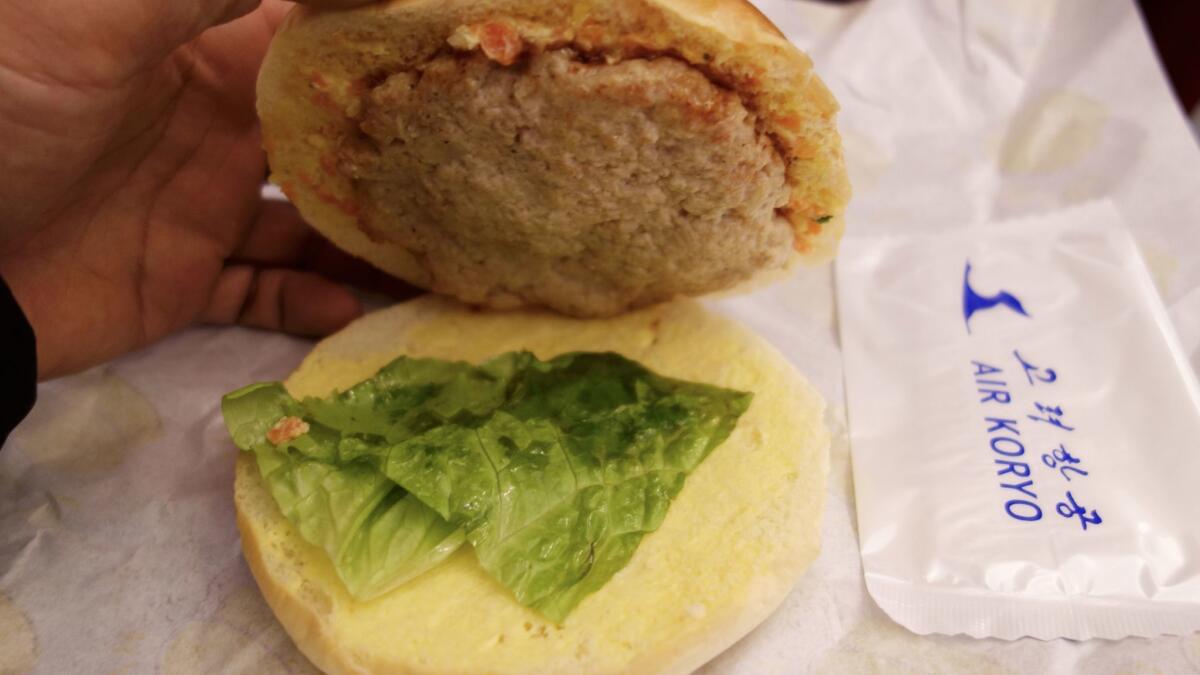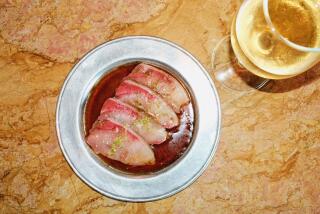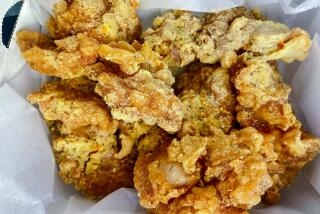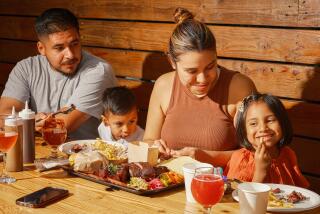North Korea on a bun: What the legendary Koryo Burger tells us about the isolated nation, and ourselves

Reporting from PYONGYANG, North Korea — On Air Koryo, North Korea’s state airline, flight attendants are known to serve one thing, and one thing only: a burger as mysterious as the secretive country itself.
The burger is always served cold, and always on a paper doily. Inside the bun is a piece of unidentified meat, a slice of processed cheese, a dash of shredded cabbage or a lonely lettuce leaf, and a dollop of sweet, brown sauce.
The “Koryo Burger” features in countless Instagram feeds and online reviews, not many of them complimentary. It has “gained cult status among passengers,” the British tabloid Daily Mail remarked in 2015. Many wonder: Why a burger, of all things? What’s with the doily? What exactly is that meat?
“The Air Koryo burger was the worst example of soft power I’ve ever tasted,” said Alec Ash, a writer in Beijing who sampled the burger on a flight to North Korea last year.
But there’s another side to the phenomenon. What if the West’s fascination with the Koryo Burger says less about the Koryo Burger than it does about the West?
The burger is “huge” in terms of public fascination, said Simon Cockerell, general manager of the Beijing-based travel company Koryo Tours. “It’s something that people are absolutely blown away by. And it’s a piece of meat between two buns.” (Koryo refers to an old Korean dynasty; the two companies are unrelated).
“I think it’s just the incongruity of having a burger on a quote-unquote ‘communist’ plane,” added Cockerell, who has visited North Korea 161 times in the past 15 years. “But what else would they serve? You can’t give everyone a bibimbap (a Korean mixed rice dish), and serving kimchi on a plane would be horrifying.
Air Koryo also offers a vegetarian option — the same burger, but with a tomato slice instead of meat.
“I think it’s just that North Korea, to tourists, is so inherently sinister and funny at the same time,” he continued. “That ‘Oh, my God, it’s a burger!’ — that’d be an absurd reaction on any other airline. But on Air Koryo, it’s a normal thing to do.”
The meat, Cockerell added, is chicken. If true, that would settle years of speculation on the Internet that until now had never managed to end in a verdict.
There’s no such thing as a failed missile launch »
(A man who picked up the phone at Air Koryo’s Beijing office confirmed that the airline “normally” serves burgers. He could not confirm the type of meat).
From 1994 to 1998, North Korea was ravaged by famine. Hundreds of thousands of people starved to death, according to best estimates. People ate bark and leaves to survive.
Although malnutrition remains common in North Korea, starvation is now rare. Since the Communist country’s public food distribution system collapsed in the mid-1990s, its citizens — with the state’s tacit approval — have turned to the gray market to survive. Supermarkets have proliferated — as have restaurants. Some sell Western meals.
“If you have a growing capitalist economy, somebody is buying jets and diamonds, and somebody is eating a nice protein-rich meal every day,” said Andrei Lankov, a North Korea expert at Kookmin University in Seoul. “Of course they are not buying diamonds constantly, and a protein-rich meal is still beyond the means of most people — even if the diet of the masses is improving fast.”
Zhao Bin, 35, a businessman from the northeastern Chinese city of Shenyang, said that on his first visit to Pyongyang, in 2003, the electricity cut out every night. “The second time I went was almost 12 years later, and I think North Korea has developed a lot, and people’s lives have improved dramatically.”
Pyongyang’s restaurant offerings now include fried chicken, pizza, sushi — and yes, burgers. A burger, he said, costs about $1.50, and a 9-inch pizza costs less than $15. “My impression of having foreign food [at Pyongyang’s restaurants] is that the service is exceptional, and the ingredients are all very fresh — unlike China, where there’s so much low-quality meat and vegetables.”
He gave the Koryo Burger high marks. “I think the meat they use is thicker and better than the stuff you get at KFC or McDonald’s,” he said.
North Korea’s secrecy is, in itself, no secret. Reporting trips are tightly controlled, and defector accounts often are impossible to verify. In the absence of information, rumors proliferate — and the wackier they are, the more rapidly they spread.
In 2012, international media reported that North Korea claimed to “discover” the existence of unicorns. In 2014, they reported that North Korea was forcing Pyongyang’s men to adopt leader Kim Jong Un’s distinctive hairstyle. Both stories were false; both went massively viral.
The West’s fascination with the Koryo Burger, Cockerell said, springs from that same sense of intrigue.
“People think it’s incongruous for the North Koreans to be eating a burger because it’s this archetypal Western dish,” he said. “But one, [the Koryo Burger] is an insult to Western food, and two, putting meat inside bread is hardly exclusive to the West.”
Air Koryo is known for its perennial features: its aging Russian-made planes, its drab interiors, its propensity to blare militaristic propaganda mid-flight.
South Korea faces political crisis, nuclear threat and Trump’s history lesson »
But like North Korea itself, its culinary offerings have changed over time. For years, the airline served the burgers only on outbound flights from Pyongyang, Cockerell said. On inbound flights, it offered a full meal, including curry rice and side dishes.
“Then, for some reason, presumably budget, they switched to burger in both directions,” he said. At one time, Air Koryo also served “a sort of sandwich wrapped in a Danish pastry.” That lasted a few months; then it was back to the burger.
The burger itself, he said, has improved in recent years. It tastes much the way it looks: bready, chewy and bland. And for those who don’t eat meat, Air Koryo also offers a vegetarian option — the same burger, but with a tomato slice instead of meat. “The only vegetarian option used to be to not eat it, or to take the meat substance out,” Cockerell said.
And last week, when Koryo Tours brought several tourists to Pyongyang for its annual marathon, their flight from Shanghai served a full meal, including chicken with white sauce, canned fruit, mixed pork, fried fish with bread crumbs and a small cake.
Many of the tour participants joked they were disappointed not to receive a Koryo Burger on the flight, said Rich Beal, the company’s tour manager. But they had no reason to fret. On their return flight two days later, the burgers were back.
Gaochao Zhang in The Times’ Beijing bureau contributed to this report.
For more news from Asia, follow @JRKaiman on Twitter
More to Read
Sign up for Essential California
The most important California stories and recommendations in your inbox every morning.
You may occasionally receive promotional content from the Los Angeles Times.










